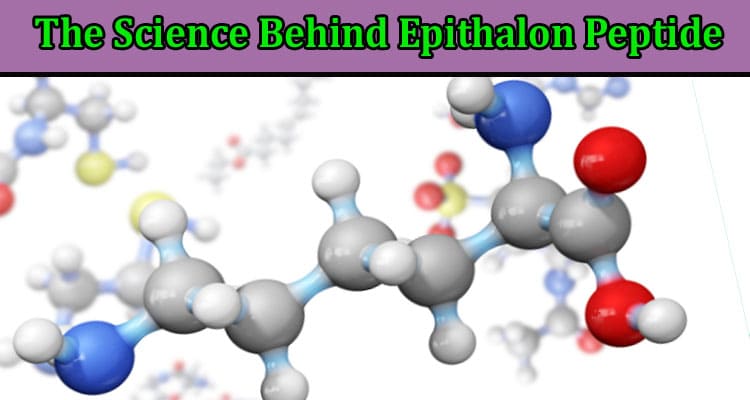Epithalon is an intriguing anti-aging peptide supplement that has been gaining popularity recently.
But how does this enigmatic compound actually work? Let’s explore the science behind epithalon to understand its mechanisms and potential applications.
What is Epithalon?
Epithalon, or epithalamin, is a special kind of molecule made from four amino acids: alanine, glutamine, glycine, and methionine. It was created by Professor Vladimir Khavinson back in the 1980s at The St. Petersburg Institute of Bioregulation and Gerontology.
What makes it interesting is that our brains make it naturally in an important part called the epithalamus. This area helps control the hormones related to aging. The thought is that by taking epithalon, you might be able to support a more youthful body. If you’re interested, you can find places to buy Epithalon online
Key Mechanisms of Epithalon
Research indicates that it works through several key mechanisms:
Telomerase Activation
Telomeres are protective caps on the ends of DNA strands that shorten each time a cell divides. When they become too short, cells stop dividing and become inactive or apoptotic. The enzyme telomerase replenishes telomere length to extend cellular life. Studies show it activates telomerase in human cell cultures, potentially promoting cellular longevity.
Regulation of Gene Expression
Epithalon has been found to regulate expression of certain genes involved in cell cycle control, proliferation, and apoptosis. For example, epithalon may suppress expression of the p21 gene which normally inhibits cell replication. Downregulating p21 could allow cells to divide more times before becoming senescent.
Circadian Rhythm Regulation
The epithalamus contains the master circadian pacemaker which synchronizes the sleep/wake cycle. Epithalon helps regulate clock genes like Bmal1 that control circadian rhythms. By maintaining a robust circadian clock, it may improve sleep and hormone balance.
Antioxidant Effects
Aging is driven in part by free radicals that damage DNA, proteins, and lipids in cells. Epithalon exhibits antioxidant properties to counteract this oxidative stress. In rats, it increased antioxidants like superoxide dismutase to combat free radicals.
Immune Regulation
The thymus gland is central to immune function but shrinks with age. Epithalon has been shown to restore size and function of the thymus. It also balances the Th1/Th2 system to optimize immune response.
Neuroprotection
Studies indicate that it can protect neurons and ameliorate declines in learning and memory. It may act as a neurotrophic factor supporting nerve growth and signaling. Epithalon improved cognition in aging rats, hinting at brain protective benefits.
Through these multimodal mechanisms, epithalon aims to slow cellular aging and maintain youthful physiology. But translating these findings to humans requires much more research.
Epithalon’s Effects on Hormones
In addition to direct effects on cells and genes, it also influences aging by optimizing key hormone levels, including:
- Melatonin – Epithalon raises melatonin, which regulates sleep/wake cycles and has antioxidant properties.
- Corticosteroids – It normalizes cortisol, with potential to reverse age-related chronic stress.
- Thyroid hormone – Triiodothyronine (T3) levels increase, stimulating metabolism.
- Insulin-like growth factor – Higher IGF-1 signals cells to divide and may prevent atrophy.
- Sex hormones – Epithalon increased testosterone in aged rats, suggesting rejuvenating effects.
These hormonal modulating effects likely complement epithalon’s direct activity at the cellular level.
Epithalon Clinical Research
Much of the research on epithalon has been limited to animal and in vitro studies so far. However, a few small human trials have been conducted:
- In one study, 12 healthy elderly volunteers took daily for one month. Cognitive tests showed improved memory, attention, and thinking speed, suggesting neuroprotective effects.
- Another trial administered epithalon to 19 patients with vision problems due to age-related retinal damage. After three months, visual acuity significantly improved in over 70% of subjects.
- Sex hormone levels in middle-aged and elderly patients increased after one month of epithalon treatment in another study. Benefits persisted three months after stopping.
Although the initial research it shows promise, it’s important to note that these studies were relatively small in scale and conducted over short periods. To get a more comprehensive understanding of its effects, especially on extending lifespan, larger, placebo-controlled human trials are necessary.
Nevertheless, these early findings have sparked growing enthusiasm for epithalon, which is often regarded as one of the most promising anti aging peptides.
Epithalon Dosing
When used as a supplement, it is typically administered in microgram amounts either by injection or orally.
- Injections – Injections are given subcutaneously or intramuscularly, often in 5-20mg daily doses. Cycles may last for 1-2 months.
- Oral – Epithalon can also be taken in oral peptide formulas, usually around 10-30mg per day. Sublingual drops allow it to absorb under the tongue.
Due to epithalon’s short half-life, frequent dosing is needed to maintain stable blood levels. Oral bioavailability is lower than injected, so oral doses are often higher. Proper dosing can be refined through trial and error.
Is Epithalon Safe?
Human studies to date suggest that it has a reasonable safety profile. Since it is a peptide naturally produced in the brain, side effects appear mild at recommended doses. Potential adverse reactions may include:
- Temporary drowsiness/lethargy
- Headaches
- Mild pain or redness at injection sites
- Nausea if high oral doses
Animal studies have found no toxicity even at extremely high doses. More research is still needed on long-term safety though. As with any peptide, it’s best to start low and increase slowly while assessing tolerance.
Conclusion
The science indicates epithalon is a promising anti-aging peptide that works through multiple mechanisms to potentially slow cellular senescence. It shows beneficial effects on telomeres, gene expression, hormones, antioxidants, and more in studies.
However, translating these findings to human longevity and healthspan requires much larger clinical trials over extended periods.
In theory, it appears to target several key aging pathways – but whether it meaningfully extends human lifespan remains unproven. Nonetheless, it is an exciting prospect in anti-aging science that merits ongoing research.

